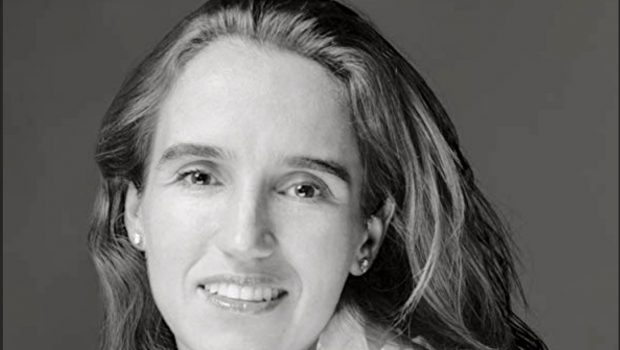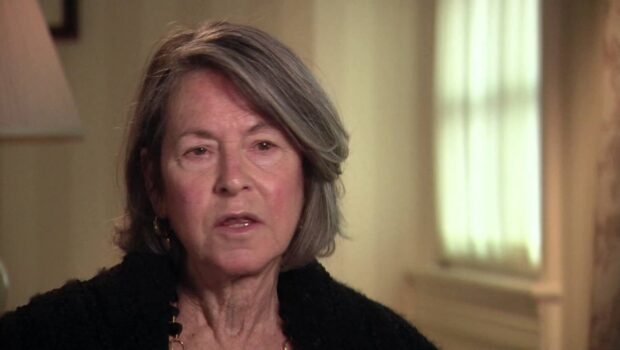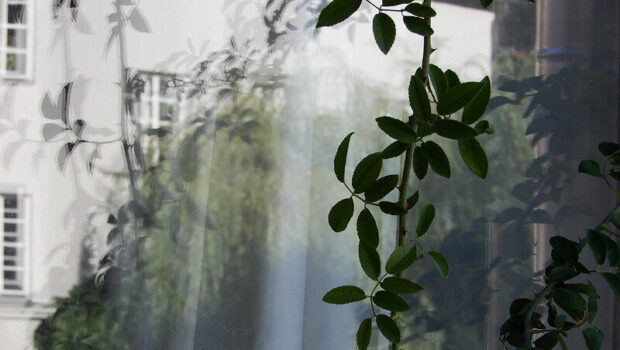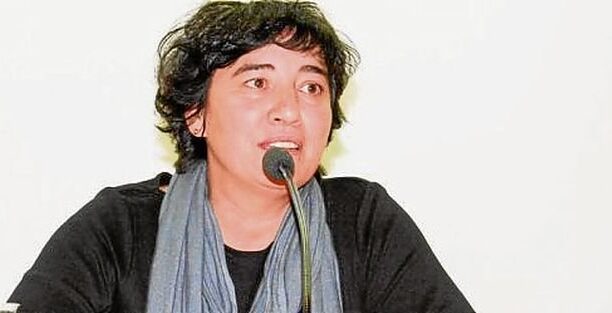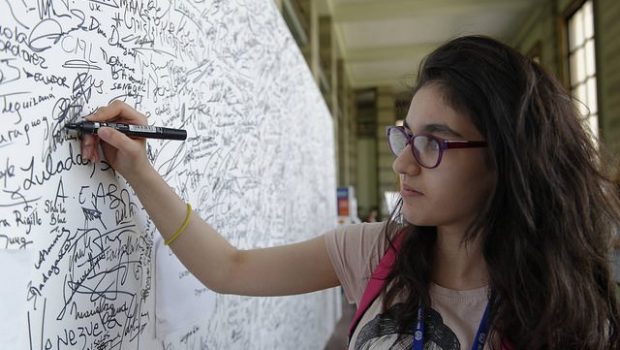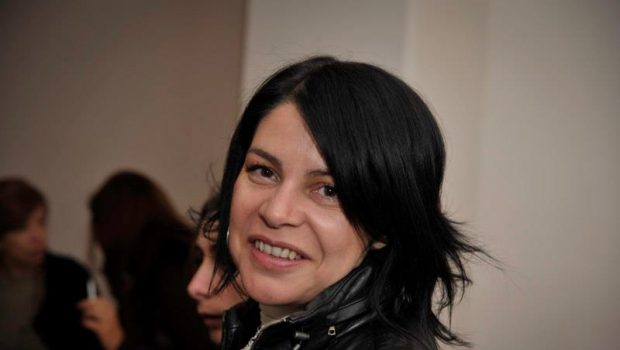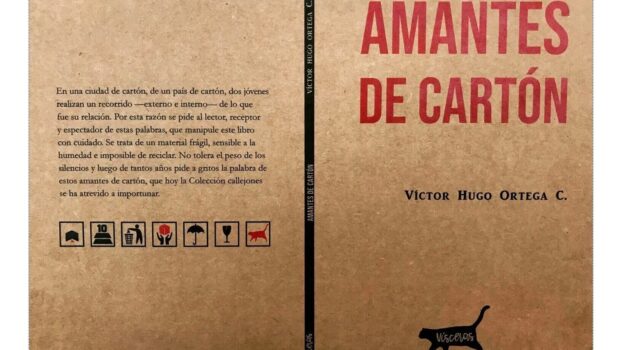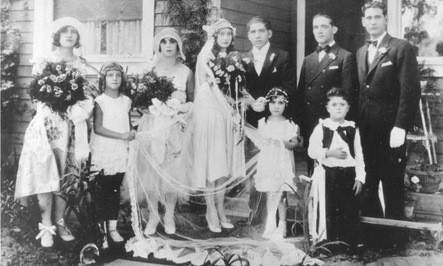LEPROSY ON WALLS
LA LEPRA DE LAS PAREDES
Bernardo Esquinca
English translation by Tanya Huntington
For years, my family used to celebrate Christmas at a villa in Desierto de los Leones. Built on top of a cliff in the early 1970s, it was three stories tall: on the top floor were found the bedrooms of my uncles, aunts and three cousins; in the middle, the living room, dining room, breakfast nook and kitchen; and down below, a blend of recreational and work spaces: a semi-circular area for gathering around the fireplace, a bar with a sink, and a study with green carpet and wood paneling where my uncle, who was an accountant, would retreat to pore over invoices. Glass sliding doors led to the back yard, which offered a pleasant view of the valley. Down a spiral staircase was the final and strangest part of the architectural layout: a triangle of leftover property, bordered by a chain link fence and filled with overgrown grass that would forever engulf any ball that landed there.
I spent long stretches of my childhood and adolescence in that house, and in time it came to form part of my personal mythology, filling my adult dreams with images as enigmatic as they were disturbing. Whenever we had summer or Christmas vacations, I would travel from Guadalajara to Mexico City and settle into the guest room, then spend the rest of the time playing with my cousins: soccer, Dungeons & Dragons on the Playstation, hide and seek, whatever we felt like. We also listened to music. I can still recall with a blend of nostalgia and shame how we’d pass around the album cover from Grease and take turns kissing Olivia Newton-John’s face. But best of all was supper time. The two live-in maids would prepare tasty treats for us: sopes, gorditas, or quesadillas accompanied by salsa made fresh with a mortar and pestle. Back in Guadalajara, I had to make my own supper, so these delicacies made me feel like a hotel guest. Another special thing about the villa was the spiral service stairway that led from the roof all the way down to the backyard. We would use it as if it were a secret passageway in the games we invented.
Years later, as I was drinking beer and reminiscing in downtown Tlalpan cantina with my cousin Claudio, he told me a few things I didn’t know about the villa in Desierto de los Leones and the lot it was built on. After the Revolution, the cliff was a seedy area where whorehouses and casinos proliferated for years, frequented by thieves, highway robbers and assassins. He told me that in that neck of the woods, there had been plenty of coursing blood, pain and death.
Plunking his bottle down on the table, he added in a disturbingly normal voice, “And that’s why there were so many Subhumans and Vapors in the house.”
His confession knocked me off balance. I have never seen anything not of this world, but I know, as the famous line from Hamlet goes, that there are more things in Heaven and Earth than are dreamt of in our philosophy. Besides, I write horror stories for a living. It’s my job to scare other people. And I was just now finding out that the villa where I used to stay as a boy was haunted.
As usual, when something major happens, I’m the last to know.
***
It’s no coincidence I’m remembering all of this now. It’s December 24th, and I’m packing my bags to return one last time to the villa in Desierto de los Leones. The property has been sold. Soon, it will be demolished and replaced by a huge tower of condominiums. My aunt and uncle, who have lived in Cuernavaca for a long time now, summoned a family gathering to celebrate Christmas like we used to in the old days. A farewell party of sorts. I do the math and realize that it has been over a decade since I last set foot in the villa, which gives me mixed feelings. It will be the first and only time I’ve gone back since I found out it was haunted. I feel both excited and scared. But it’s not the ghosts I’m afraid of. The residence in Desierto de los Leones contains something even more disturbing: happy memories. I’m 50 years old, with two divorces under my belt and a literary career that hasn’t quite taken off. I don’t know how it will make me feel to enter that great wooden gate one last time. Probably as if I were just another ghost, like all the rest.
I’m scared I won’t want to leave.
Gazing into the bathroom mirror as I groom my beard, my reflection offers a scathing notion: maybe you never left, Bernardo.
I’m always the last in line because I’m the youngest of seven siblings. The last one to graduate, to get married, to have kids. As a child, I would watch my brothers play soccer in the street from my bedroom window. I attended their weddings as a page and was served soda at the receptions while I watched the other guests get drunk. I grew up suffering from a time-space dislocation of sorts: all the best things always happened to other people, in other places. That’s why I considered the villa at Desierto de los Leones, where my cousins were the same age as me, my home away from home. My parents were aware of the problem and let me stay for weeks on end. They felt guilty about having me so many years after their next-to-last child. I was what they called in those days a pilón, or an extra: one last unplanned pregnancy. My siblings changed my diapers and grounded me when I misbehaved; I had plenty of parents, but no playmates.
I grew up like a ghost under my own roof.
***
Now it’s time to tell the story of the incident in the caverns.
Below the cliff at the villa in Desierto de los Leones was a small valley with a creek running through it. Rising up at the end of this valley was a hill, where a handful of houses lined a single street. To one side of this incipient urban sprawl were three caverns: tunnels left behind from an abandoned sand mine. We had a clear view of them from the balcony of the television den. My cousins and I liked to spend hours gazing out at them, imagining what we might find inside.
One morning in early December, after the winter cold had started to seep in, Claudio launched a challenge:
“We’re going to the caves. Don’t be pussies!”
In addition to my cousins, a couple of friends of his were there. They all reacted enthusiastically. I, on the other hand, declined. I was scared, and moreover, I felt adventures were supposed to take place inside the imagination. I believed it then, and still I believe it today. I made up an excuse about feeling sick to my stomach and stayed home. The group left just after the big midday meal. I watched them from the balcony; saw how they climbed over the triangular fence into the second backyard, then disappeared among the trees. Abandoned, there was nothing left to do but watch a game show. As it grew dark, I regretted not having tagged along. I was a coward.
My cousins and their friends returned four hours later, just in time for supper. Their clothes and faces were splattered with mud. They were as exhausted as they were hungry. It had truly been an adventure getting there, they told me, devouring one sope after another. Their story described in detail the obstacles they had confronted: the creek that suddenly grew wide, the wild dogs that had chased them in the valley, the hill’s rocky terrain. In comparison, the caverns had turned out to be a disappointment. All they found were some rusty tools and rotten ropes, the smelly mattress of a homeless guy. They hadn’t stayed long, because the sun was starting to set.
After supper, the friends went home and my cousins turned on the Playstation. Later on, when I was about to fall asleep, Claudio entered the guest room, sat on my side of the bed, and told me something had happened to him in the caves.
“Swear you won’t tell a soul,” he demanded.
“I swear,” I replied, intrigued.
He told me he was the one who had gone farthest in their exploration of the caverns. He discovered that they were all connected. He wasn’t carrying a flashlight: he used a cigarette lighter to illuminate his path, but it burned his fingers and he had to let it go out every time it heated up. As a result, he became disoriented and got lost for several minutes, moving from one tunnel to the next, unable to find the way out. At some point, he saw a figure coming towards him and thought it was one of his companions. When he got close enough, he saw something that surprised him: it was me.
“I thought you had changed your mind and caught up with us after all,” Claudio said.
Then, in the faint glow of the lighter, my cousin realized something else.
“It was you,” he added. “But older: you had a beard.”
A draft blew out the lighter flame. When he lit it again, there was nothing there.
My cousin managed to get out of the caves, but didn’t tell anyone about the incident.
“What do you think it might have been?” I asked him, my voice quavering.
Claudio stood up, headed for the door of my room, and remained there on the threshold, pensive. Before he left, he said:
“There are only two possibilities: either I’m crazy, or I saw your double.”
Both were disconcerting. That night, I slept with the light on.
***
In ancient times, they used to describe haunted houses in a special way. In a parable from the book of Leviticus, the Bible describes a law suggesting houses could be infected, not unlike people’s skin or their clothing. It was called leprosy on walls. Once this happened, the priest would enter the home and examine the stains that had appeared. “He is to examine the mold on the walls, and if it has greenish or reddish depressions that appear to be deeper than the surface of the wall,” according to verses 37 to 38 of Book 14, ” the priest shall go out the doorway of the house and close it up for seven days.” An exorcism that was complemented with a ritual: two birds were carried to the house; one of them was sacrificed and its blood, spattered on the affected walls. Then the living bird was released outside the city, in the countryside. “In this way he will make atonement for the house, and it will be clean.” A modern interpretation might relate those stains to moisture or mold, however, I couldn’t help but find it interesting that a haunted house was considered to be a living thing, one that could suffer from illness.
An exorcism had been performed at the villa at Desierto de los Leones. That afternoon in the Tlalpan cantina, Claudio told me he had brought in a medium to perform a cleansing. The woman lit copal incense and votive candles. Prayers were recited. She was the one who told them that there were Subhumans and Vapors; terms that in esoteric language are used to refer to demons and ghosts. What had brought on the medium’s visit? Strange things had started to happen at the villa: jars flew into the air and crashed on the floor, objects were lost and never found, echoes of conversations were heard. They grew louder at daybreak. And worse yet, a presence lurked in a corner of the breakfast nook, where it was not unusual to feel inexplicably cold, while glimpsing a silhouette out of the corner of one’s eye. The maids described it as an old man wearing a hat.
After the cleansing, the Subhumans disappeared. But the Vapor remained, until one night, Claudio decided to confront it.
***
The villa at Desierto de los Leones appears constantly in my dreams. In them, the inside of the residence is much larger than it actually is, and different time periods tend to blend together: I see myself in shorts, playing ball, or sipping wine with one of my ex-wives. In the most commonly recurring dream, I am an adult. Alone, I descend the spiral staircase that leads downstairs to the service room, where a door opens out onto the backyard. But instead of the room where the maids sleep, there is a dark, vast corridor: a tunnel that runs from one end of the house to the other. I explore that passage, filled only with dense blackness and a moisture that emanates from the walls. I know I am in the villa and at the same time, someplace else. It is a threshold or a portal —a womb, perhaps. As I walk, a growing sensation of anxiety overpowers me. The tunnel seems endless, and my unrest is derived from an absolute certainty: turning back is not an option. I must move on. On the other side there is something, someplace I have to go, where a presence awaits me. The most unsettling part is that I can never get all the way there. I always awake with the uncomfortable sensation that a part of me has been left behind in that dream, and that I won’t get it back until an understanding—one that for the time being, has been denied me—is revealed.
***
My cousin Claudio is a musician. After his parents moved in Cuernavaca, he transformed the ground floor office into a recording studio. He makes a living writing jingles. Back in the day, he used to play with his rock band at a bar several nights a week. When he got home, he would go to his studio and work for a few hours; it helped him control the adrenaline, reconcile sleep. One night just before dawn, while he was composing a chorus about gastritis medication, he took a break and went upstairs to the kitchen for a snack. While passing through the breakfast nook, he felt the presence of the Vapor: the hair on the back of his neck stood up and a sudden, sticky coldness enveloped him, as if he had put on a damp sweater. He remembered the medium’s advice, and decided to confront it. YOU ARE NOT WELCOME HERE, he shouted. GET OUT, and he recited the prayer the medium had taught him. After a tense silence, he decided to return to the studio.
A few minutes later, he started to hear a strange noise. At first, he thought it was a kind of interference, a sound that had filtered into his headphones. But after he removed them, he realized that the noise continued. He looked around and discovered something that made his jaw drop: a cascade of water was falling from the studio ceiling and rolling down one of the walls. Alarmed, he ran to the stairs only to find more water; he had to splash his way up to the next floor. The breakfast nook had flooded. The water came above his ankles. Claudio was overwhelmed by a situation that was as unexpected as it was urgent. After a few moments of paralysis, he reacted and sought out the source of the trouble. He found it in the kitchen: the plumbing under the sink was leaking. He located the valve and turned it off. He had to awaken his siblings to help him bail out the standing water. Dawn came upon them as they finished mopping the floor dry.
“Nothing like that had ever happened before,” Claudio told me at the bar in Tlalpan. “Not so much as a drip.”
A major coincidence: right after confronting the Vapor came the only flood the villa had ever experienced during its forty years of existence. But Claudio and I knew nothing happens by chance.
“What happened to the ghost?” I asked.
My cousin took a long swig from his bottle beer.
“We never felt it again,” he said. “After that night, it disappeared.”
***
Dawn. Dinner is almost over. The menu, a tribute to all the family Christmases we had ever celebrated: turkey, codfish, ham, romeritos, apple salad, plenty of wine. I hear the conversation, the laughter that emanates from the dining room, as I descend, wavering—the aftereffects of alcohol—the stairs that lead to the ground floor of the villa. I took the time to assess my surroundings before heading down. The parquet on the floor is swollen, and several sections have come loose. The walls are crumbling and covered with moisture stains. The carpets are dirty and worn. I find the deterioration of the villa unbearable. It looks more like the place that appears in my dreams than the one from my childhood memories.
If these were Biblical times, the house would be considered infested by the local priests. That’s how I saw it: a leprosy of the past.
Some household items remained: lamps, bookshelves, tables. My uncle and aunt were giving them away to interested relatives over dinner. They have a month to clear out what’s left before the heavy machinery arrives and the demolition process begins. Then, bulldozers and wrecking balls will pulverize the place that houses my family’s memories. It occurs to me that not everything that has taken place inside the villa can be destroyed: it will be liberated, like the contents of Pandora’s box.
I open the sliding doors that lead into the backyard overlooking the cliff. The icy wind strikes my face, reanimating me. I corroborate what I already knew: the valley has disappeared, making way for a super highway of concrete that runs beneath the villa and connects the second tier of the beltway to Santa Fe. They named it the Avenue of the Poets. The hill is still there on the other side, but with many more buildings and streets.
I have always been the last one to arrive. This is a curse when things are good, but it can be a blessing when they’re bad. I don’t know what’s in store for me this time. I walk out into the yard and head for the stairs that descend to the triangle of overgrown weeds, on the farthest end of the property. I hesitate on the first step. I can feel the presence of the villa at Desierto de los Leones behind me, a dying entity that now seems to loom over me, urging me onward. I won’t turn back. Just like in my dream, I know I have to move on.
I scan the horizon. The caves with their black, gaping holes are still out there on the hillside, waiting for the moment to swallow me whole.
Durante muchos años mi familia celebró Navidad en la casona del Desierto de los Leones. Fue construida sobre una barranca a inicios de la década de los setenta, y tenía tres niveles: el superior, donde se encontraban las recámaras de mis tíos y mis tres primos; el medio, en el que se ubicaban la sala, el comedor, el desayunador y la cocina, y el inferior, que tenía una zona mixta de esparcimiento y trabajo: una espacio en forma de media luna en torno a una chimenea; una barra con una tarja, y un estudio de alfombra verde y paredes de madera donde mi tío, que era contador, se encerraba a revisar facturas. Unas puertas corredizas de cristal daban paso al jardín, que ofrecía una vista agradable de la barranca. Por unas escaleras de caracol se descendía a la parte final y más extraña de la casona: un triángulo de la propiedad que le había sobrado al arquitecto, y en el que sólo había una cerca de malla y un pasto demasiado crecido, que se tragaba los balones que iban a parar allí.
Pasé largas temporadas de mi infancia y mi adolescencia en ese hogar, que con el tiempo se volvió parte de mi propia mitología: pobló mis sueños de adulto con imágenes tan enigmáticas como perturbadoras. Cada que había vacaciones de verano o de fin de año, me trasladaba desde Guadalajara al Distrito Federal para instalarme en el cuarto de visitas, y pasar los días jugando con mis primos: al futbol, al Dungeons & Dragons en el Playstation, a las escondidas, a lo que se nos ocurriera. También escuchábamos música; recuerdo con una mezcla de vergüenza y nostalgia que nos turnábamos la portada del disco de Vaselina para darle besos al rostro de Olivia Newton-John. Lo mejor de todo era la hora de la cena; las dos sirvientas que allí vivían preparaban garnachas deliciosas: sopes, gorditas o quesadillas acompañadas de salsa molcajeteada. En Guadalajara debía cocinarme la merienda, así que ese agasajo me hacía sentir como el huésped de un hotel. Otra cosa especial que tenía la casona eran unas escaleras de servicio en forma de espiral, que iban de la azotea hasta el jardín, y que utilizábamos como si se trata de un pasadizo secreto en los juegos que inventábamos.
Años más tarde, mientras bebíamos cerveza y recordábamos viejos tiempos en una cantina del centro de Tlalpan, mi primo Claudio me contó algunas cosas que yo desconocía sobre la casona del Desierto de los Leones y el terreno donde fue construida. Me dijo que en los años posteriores a la Revolución, la zona de la barranca era un lugar de mala muerte, donde proliferaban prostíbulos y casinos, frecuentados por ladrones, salteadores de caminos y asesinos. Que por esos rumbos había corrido mucha sangre, dolor y muerte.
Tras depositar la botella en la mesa, agregó, con una escalofriante naturalidad:
–Esa es la razón por la que en mi casa había Infrahumanos y Descarnados.
Su confesión me descolocó. Nunca he visto nada que no sea de este mundo, pero sé, como dice la famosa línea de Hamlet, “que hay más cosas en el cielo y en la tierra de las que han sido soñadas…”. Además, me dedico a escribir literatura de terror. Vivo de espantar a los demás. La casona de mi infancia era un lugar embrujado, y apenas me enteraba.
Como era costumbre en mi vida, llegaba tarde a los acontecimientos importantes.
***
No es casualidad que ahora recuerde todo esto. Es 24 de diciembre y me preparo para volver, por última vez, a la casona del Desierto de los Leones. La propiedad fue vendida. Pronto la demolerán y en su lugar se construirá una gigantesca torre de departamentos. Mis tíos, que viven en Cuernavaca desde hace años, convocaron a la familia para celebrar la Navidad como en otras épocas, a manera de despedida. Hago cuentas y comprendo que hace más de una década que no he puesto un pie en la casona, lo que me provoca sentimientos encontrados. Será la primera y única vez que entre en ella desde que sé que está embrujada. Me emociona y aterra al mismo tiempo. Pero no temo a los fantasmas. La casona del Desierto de los Leones contiene algo aún más inquietante: recuerdos felices. Tengo 50 años, dos divorcios a cuestas, una carrera literaria que no termina de despegar. No sé cómo me voy a sentir una vez que traspase la enorme puerta de madera de la entrada. Probablemente, como un espectro más de los que la habitan.
Me da miedo no querer salir de allí.
Me miro al espejo del baño mientras me arreglo la barba y mi reflejo me devuelve un pensamiento hiriente: tal vez nunca has salido de allí, Bernardo.
Llegué tarde a todo porque soy el menor de siete hermanos. Fui el último en estudiar, en casarme, en tener hijos. De niño veía a mis hermanos jugar futbol en la calle desde la ventana de mi cuarto. Asistí a sus bodas como paje y en ellas bebía refresco, observando cómo el resto de los invitados se emborrachaba. Crecí con una dislocación del tiempo y el espacio: las mejores cosas siempre le pasaban a otros, en otro lugar. Por eso hice mía la casona del Desierto de los Leones, donde mis primos tenían mi edad. Mis padres eran conscientes del problema, y me dejaban pasar allí semanas. Sentían culpa por haberme tenido con tantos años de diferencia respecto al penúltimo hermano. Fui lo que en aquellos tiempos se llamaba un “pilón”: un último hijo no planeado. Mis hermanos me cambiaban los pañales y me regañaban; tuve muchos padres, pero ningún compañero de juego.
Crecí como un fantasma en mi propia casa.
***
Ahora debo relatar el incidente de las cuevas.
La barranca de la casona del Desierto de los Leones desembocaba en un pequeño valle, que era atravesado por un riachuelo. Al final de ese valle se levantaba una colina que tenía algunas casas, y una sola calle. A un lado de esa incipiente urbanización había tres cavernas: los túneles dejados por una antigua mina de arena. Desde el balcón del cuarto de la televisión se apreciaban claramente. A mis primos y a mí nos gustaba pasar largo rato contemplándolas, mientras imaginábamos lo que podría encontrarse dentro.
Una mañana de principios de diciembre, en la que ya calaba el clima invernal, Claudio lanzó el reto:
–Vamos a las cuevas. No sean maricas.
Además de mis primos, había un par de amigos suyos. Todos se mostraron entusiasmados. Yo me negué: por una parte, me daba miedo, y por otra, consideraba que las aventuras debían ocurrir en la imaginación. Lo pensaba entonces y los sigo pensando ahora. Pretexté sentirme mal del estómago y me quedé en la casa. El grupo partió después de la comida. Los seguí con la mirada desde el balcón; los observé saltar la malla triangular del segundo jardín, y luego adentrarse en los árboles. Abandonado, no tuve más remedio que ponerme a ver un programa de concursos. Conforme anochecía, me arrepentí de no haberlos acompañado. Era un cobarde.
Mis primos y sus amigos regresaron cuatro horas después, a tiempo para la cena. Tenían la ropa y los rostros manchados de lodo. Estaban tan exhaustos como hambrientos. Había sido una aventura llegar hasta allí, me contaron mientras devoraban un sope tras otro. Su relato fue detallado en los obstáculos que tuvieron que sortear: el riachuelo que de pronto se ensanchaba demasiado, unos perros salvajes que los persiguieron en el valle, la subida por la colina llena de piedras. En cambio, las cavernas no habían resultado tan emocionantes. Tan sólo encontraron herramientas oxidadas, cuerdas podridas, el colchón apestoso de un indigente. Habían permanecido poco tiempo en ellas porque el sol comenzaba a ocultarse.
Tras la cena, los amigos se despidieron y los primos nos fuimos a jugar Playstation. Más tarde, cuando estaba a punto de dormirme, Claudio entró en el cuarto de huéspedes, se sentó a mi lado en la cama, y me dijo que algo le había ocurrido dentro de las cuevas.
–Júrame que no se lo vas a contar a nadie –exigió.
–Te lo juro –respondí, intrigado.
Me relató que él había sido quien más lejos llegó en la exploración de las cavernas. Descubrió que estaban conectadas. No llevaba linterna: se iluminaba con la luz de un encendedor, el cual debía apagar cada que se calentaba, porque le quemaba los dedos. Por lo tanto, se desorientó; estuvo unos minutos perdido, pasando de un túnel a otro, sin encontrar la salida. En algún momento, vio venir una figura hacia él; creyó que se trataba de alguno de sus acompañantes. Cuando la tuvo frente a él, contempló algo que lo sorprendió: era yo.
–Pensé que al final te habías animado y nos habías alcanzado –dijo Claudio.
A la débil luz del encendedor, mi primo se dio cuenta de otra cosa.
–Eras tú –añadió–. Pero más grande: tenías barba.
Una corriente de aire apagó la llama del encendedor. Al volver a prenderlo, no había nadie frente a él.
Mi primo logró salir de las cuevas, y no comentó el incidente con nadie.
–¿Qué crees que pudo ser? –le pregunté, con voz trémula.
Claudio se levantó de la cama, se dirigió a la puerta de la habitación, y permaneció en el umbral, pensativo. Antes de salir, dijo:
–Solo hay dos posibilidades: o estoy loco o vi a tu doble.
Ambas eran desconcertantes. Esa noche dormí con la luz encendida.
***
En los tiempos antiguos tenían una particular manera de referirse a las casas embrujadas. La Biblia contiene un apartado en el libro del Levítico, una ley que consideraba que los hogares podían estar infectados, como sucedía con la piel de las personas o las prendas de vestir. Se le denominaba “la lepra de las paredes”. Cuando esto ocurría, el sacerdote debía entrar en la casa y examinar las manchas surgidas en los muros. “Si observa cavidades verdosas o rojizas hundidas en las paredes –dicen los versículos 37 al 38–, saldrá afuera, a la puerta de la casa, y la clausurará durante siete días”. Un exorcismo que se complementaba con un ritual: se llevaban dos aves a la casa; una de ellas se sacrificaba y con su sangre se regaban las paredes afectadas. Después se liberaba al ave viva fuera de la ciudad, en el campo. “Así hará la expiación sobre la casa, y ésta quedará pura”. Una interpretación actual podría relacionar dichas manchas con la humedad o el musgo; sin embargo, no deja de parecerme interesante que a una casa embrujada se le considerara como un ser vivo, que padecía una enfermedad.
La casona del Desierto de los Leones tuvo su propia intervención. Aquella vez en el bar de Tlalpan, Claudio me dijo que había llevado a una médium para que realizara una limpia. La mujer encendió copal y veladoras; rezó oraciones. Fue ella quien le dijo que había Infrahumanos y Descarnados; términos que en el lenguaje esotérico se utilizan para referirse a demonios y fantasmas. ¿Qué había propiciado la visita de la médium? En la casona pasaban cosas extrañas, atestiguadas tanto por mi primo como por las sirvientas: jarrones que salían volando y se estrellaban en el suelo, objetos que se perdían y jamás eran encontrados, ecos de conversaciones que se amplificaban en la madrugada. Y, sobre todo, una presencia que acechaba en una esquina del desayunador, donde era común sentir un frío inexplicable, acompañado por el atisbo de una silueta por el rabillo del ojo. Las sirvientas la describían como un anciano con sombrero.
Tras la limpia, los Infrahumanos desaparecieron. El Descarnado permaneció, hasta la noche en que Claudio decidió enfrentársele.
***
La casona del Desierto de los Leones aparece de manera constante en mis sueños. En ellos, su interior es mucho más grande que en la realidad, y suelen mezclarse los tiempos: me veo de shorts, jugando con un balón o bebiendo vino con alguna de mis ex esposas. En el sueño más recurrente, soy un adulto. Desciendo solo por las escaleras en espiral que llevan hasta el piso de abajo, donde se encuentra el cuarto de servicio, y una puerta que da al jardín. Pero en lugar de la habitación en la que duermen las sirvientas, hay un enorme y oscuro corredor, un túnel que atraviesa la casa de lado a lado. Exploro ese pasillo donde no hay más que una densa negrura y una humedad que emana de las paredes. Sé que estoy en la casona y a la vez en otro sitio. Un umbral o un portal –un útero, quizá. Camino mientras una creciente sensación de angustia se apodera de mí. El túnel parece no tener fin, y el desasosiego proviene de una certeza: regresar no es opción. Debo continuar avanzando. Al otro lado hay algo, un lugar al que tengo que ir, porque una presencia me aguarda. Lo más desconcertante es que nunca consigo llegar. Siempre me despierto con la incómoda sensación de que una parte de mí se quedó en ese sueño, y de que no la recuperaré hasta que ese conocimiento –que por ahora se me niega– me sea revelado.
***
Mi primo Claudio es músico. Cuando sus padres se fueron a vivir a Cuernavaca, transformó el estudio de la planta baja en una cabina de grabación. Vive de hacer jingles. En aquella época, tocaba por las noches en un bar con su grupo de rock, y al regresar se encerraba un par de horas a trabajar; eso le ayudaba a disminuir la adrenalina, a conciliar el sueño. Una madrugada en la que componía un estribillo para un medicamento contra la gastritis, hizo una pausa para subir a la cocina por comida. Al pasar por el desayunador, sintió la presencia del Descarnado: los pelos de la nunca se le erizaron; un frío repentino y pegajoso lo envolvió, como si se acabara de poner un suéter mojado. Recordó los consejos de la médium, y decidió enfrentarlo. NO ERES BIENVENIDO, gritó. VETE DE AQUÍ. Y recitó una oración que le enseñó la médium. Tras un tenso silencio, decidió regresar a la cabina.
Minutos más tarde, comenzó a escuchar un ruido extraño. Al principio pensó que se trataba de una interferencia, un sonido que se colaba por los audífonos. Pero cuando se los quitó, se percató de que el ruido permanecía. Miró a su alrededor y descubrió algo que lo dejó boquiabierto: una cascada de agua se precipitaba por techo del estudio y se deslizaba por una de las paredes. Alarmado, subió las escaleras, donde encontró más agua; tuvo que avanzar, chapoteando, hasta el siguiente piso. El desayunador estaba inundando. El agua le llegaba arriba de los tobillos. Claudio se sintió rebasado por esa situación tan inesperada como apremiante. Tras unos segundos de parálisis, reaccionó y buscó la fuente del problema. La encontró en la cocina: la tubería del fregadero se había roto. Localizó la llave de paso y la cerró. Tuvo que despertar a sus hermanos para que le ayudaran a sacar el agua acumulada. El amanecer los sorprendió cuando terminaban de secar el piso.
–Nunca antes había pasado algo así –me dijo Claudio, en el bar de Tlalpan–. Ni siquiera una gotera.
Una gigantesca casualidad: tras enfrentar al Descarnado, ocurrió la única inundación que tuvo la casona en sus cuarenta años de existencia. Pero Claudio y yo sabíamos que nada ocurría por azar.
–¿Qué pasó con el fantasma? –pregunté.
Mi primo le dio un largo trago a su cerveza.
–Jamás lo volvimos a sentir –dijo–. Después de esa noche desapareció.
***
Madrugada. La cena está por terminar. El menú fue un homenaje a todas las navidades celebradas en familia: pavo, bacalao, pierna de cerdo, romeritos, ensalada de manzana, mucho vino. Escucho las conversaciones, las risotadas que provienen del comedor, mientras desciendo, tambaleándome –los efectos del alcohol– por las escaleras que conducen a la planta baja de la casona. Antes me di el tiempo de recorrerla. El parquet del piso está hinchado y salido en varios tramos. Las paredes descascaradas, con manchas de humedad. Las alfombras raídas y sucias. El deterioro de la casona del Desierto de los Leones me resulta insoportable. Se asemeja más al lugar que aparece en mis sueños, que al de mis recuerdos de infancia.
Si estuviéramos en los tiempos bíblicos, sería considerado por los sacerdotes como un hogar infestado. Para mí lo está: la lepra del pasado.
Aún permanecen algunos objetos, que mis tíos han estado regalando durante la cena a los parientes interesados: lámparas, libreros, mesas. Tienen un mes para sacar lo que queda, antes de que la maquinaria pesada inicie el proceso de demolición. Excavadoras y grúas que pulverizarán el sitio que contiene la memoria de mi familia. Pienso que todo lo que ha ocurrido en la casona no será destruido: se liberará como una caja de pandora.
Abro las puertas corredizas que dan al jardín. El viento helado de la barranca me golpea el rostro, reanimándome. Compruebo lo que ya sabía: que el valle desapareció para dar paso a una súper vía de concreto, que pasa por debajo de la casona y conecta el Segundo Piso del Periférico con Santa Fe. Se llama la Avenida de los Poetas. La colina de enfrente aún existe, aunque ahora hay más construcciones y calles.
Siempre he llegado tarde a todo. Una condena para las cosas buenas, pero también una bendición ante las malas. Desconozco lo que me espera en esta ocasión. Piso el jardín y me dirijo a las escaleras que descienden al triángulo de hierba crecida, a la parte final del terreno. Me detengo en el primer escalón. Siento la presencia de la casona del Desierto de los Leones a mi espalda, esa entidad moribunda que parece inclinarse sobre mí, empujándome a seguir. No voltearé atrás: al igual que en mi sueño, sé que debo continuar avanzando.
Escruto el horizonte. Las cuevas aún están en la colina, con sus boquetes negros, esperando el momento de engullirme.
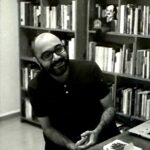 Bernardo Esquinca es un escritor mexicano. Su libro más reciente es la novela Necropolitana (2022), publicada por Almadía. En 2020 fue nominado al prestigioso Shirley Jackson Award.
Bernardo Esquinca es un escritor mexicano. Su libro más reciente es la novela Necropolitana (2022), publicada por Almadía. En 2020 fue nominado al prestigioso Shirley Jackson Award.



